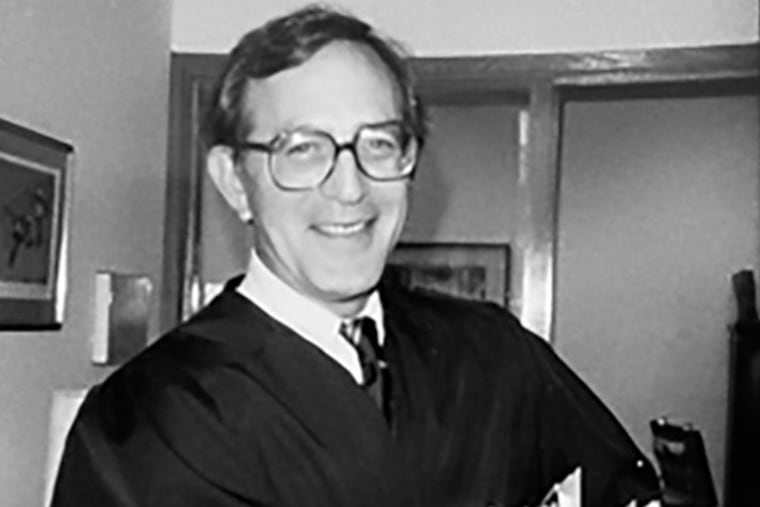Ronald P. Wertheim, senior Superior Court judge, former Peace Corps associate director, and government advisor, dies at 88
President Jimmy Carter nominated him for the U.S. Merit Systems Protection Board in 1979, and President Ronald Reagan recommended him for the Superior Court in 1981.

Ronald P. Wertheim, 88, formerly of Philadelphia, a retired senior judge for the Superior Court of the District of Columbia, former Peace Corps associate director in Brazil, and government adviser on maritime law and other issues, died Sunday, March 6, of congestive heart failure at his home in Blue Hill, Maine.
Judge Wertheim, an assistant public defender in Philadelphia in 1959, rose to associate judge on the Superior Court of the District of Columbia in 1981 and, after retiring in 1992, served as senior judge until 2019.
During his 1981 Senate confirmation hearing for the Superior Court, Judge Wertheim said his wide legal experience “exposed me to people of very different social, economic, racial circumstances and helped me to recognize that every person before a judicial body is entitled to the same courtesy and dignified treatment as any other person regardless of the number of dollars that might be involved in the matter at issue.”
From 1979 to 1981, Judge Wertheim served on the U.S. Merit Systems Protection Board, which, among other things, oversees the competence of the federal civil service, and he won a 1981 public service citation from the Hispanic Organization of Professionals and Executives.
He worked as Peace Corps associate director in northeast Brazil from 1966 to 1968 and before that as deputy general counsel. “He was able to see his cases and his work from multiple perspectives,” said his daughter, Tiana. “Because of his own hard work, he appreciated people and had a multidimensional way of seeing the world.”
A 1957 graduate of the University of Pennsylvania Law School, Judge Wertheim was editor in chief of the school’s law review and won awards for his grades in constitutional and labor law.
He was a private lawyer in Philadelphia from 1957 to 1959, and, as a private lawyer in Washington from 1969 to 1979, represented, among many others, former Sen. Herman E. Talmadge of Georgia in an ethics investigation and former Assistant U.S. Attorney General Robert C. Mardian in a successful appeal of a 1975 Watergate cover-up conspiracy conviction.
In addition to maritime law, he advised government officials on economic regulations, housing and urban development, and other issues. He published papers and guidelines on legal topics, served on arbitration panels, taught law at the University of Virginia, and was a member of the Philadelphia-based American Law Institute, the American Civil Liberties Union, and other organizations.
“He was an upstanding judge who did his work carefully, confidently and with expertise,” said Rufus G. King III, the former chief judge of the Superior Court of the District of Columbia.
Born Sept. 7, 1933, in Philadelphia, Judge Wertheim was raised by his mother, Ruth Gebelein Wertheim after his parents divorced when he was an infant. Later, as judge and arbitrator, he stressed that good parenting is crucial in child development.
He was reading at 3 years old, skipped three grades by high school, and blossomed at Mount Hermon School, now Northfield Mount Hermon, in Massachusetts. He graduated from the Wharton School of Finance and Commerce at Penn in 1954, was a two-time national chairman of Students for Democratic Action, and graduated from the Hague Academy of International Law in 1962.
He met Mitzi Mallina while working for the Peace Corps. They married in 1965, had son Carter and daughter Tiana, and divorced in 1988.
Judge Wertheim had met Philadelphia artist Elizabeth Osborne while at Penn in the 1950s. They dated for a few months, went their separate ways, married other people, and later both divorced. They reconnected in 1987, married in 1990, and he commuted weekly between Philadelphia and Washington until he retired for good. They moved to Maine in 2021.
“He was so smart and so strong, such a supportive husband,” his wife said.
His stepdaughter, Audrey Osborne Cooper, said: “Ron was a second father to me, unwavering in support and generous in sage advice.”
A tireless reader, Judge Wertheim devoured books on history, philosophy, religion, language, and biographies. He doted on his Westies and liked to walk and talk with his daughter and others. In a tribute, his family said: “A gentle and contemplative soul to the end, Ron was indeed an honorable man.”
In addition to his wife, daughter, former wife, and stepdaughter, Judge Wertheim is survived by three grandchildren, one step-grandchild, and other relatives. His son died earlier.
Services are to be held later.